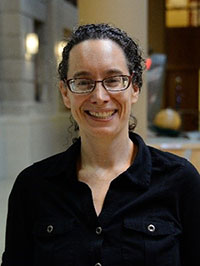While completing her dissertation on patient preferences for discussing childhood trauma at the Betty Irene Moore School of Nursing, University of California-Davis, Ellen Goldstein, MFT, PhD, found a passion for research in this emerging field.

Ellen Goldstein, MFT, PhD
She discovered the UW DFMCH Primary Care Research Fellowship was a perfect fit to continue her work and advance the science of adverse childhood experiences (ACEs), toxic stress, and resilience in vulnerable and disadvantaged populations.
ACEs and Public Health
ACEs are common across all populations and are a root cause for numerous chronic mental and physical health conditions including the leading causes of morbidity and mortality in the U.S. They can include experiences such as physical and emotional abuse, neglect, caregiver mental illness, and household violence.
“Primary care is often the first point of contact for individuals who have experienced traumatic events,” said Goldstein.
Her research has taken steps to demonstrate that it is feasible to deliver ACEs screening and brief intervention services within primary care practices serving patients at high risk for health inequities.
Primary Care Research Fellowship
A principal objective of the DFMCH Primary Care Research Fellowship is to train primary care physicians and PhD scientists interested in careers in health care research related to the organization, delivery, or effectiveness of primary health care and preventive medicine. Dr. Goldstein credits the fellowship with allowing her protected time and resources to apply for and obtain grants, collect primary data, present at conferences, and build a robust publication portfolio.
“The fellowship connected me to exceptional mentorship, which has since evolved into meaningful collaborative partnerships that continue to provide invaluable support, guidance, and direction,” added Goldstein.
Her body of work includes publications on topics ranging from psychological interventions for post-traumatic stress disorder to trauma informed care training and interventions. In 2018, she co-founded the National Collaborative on Trauma Informed Health Care Education and Research (TIHCER) https://tihcer.weebly.com—a national group of health professionals working to advance trauma-informed medical education and research.
Moving Forward
Dr. Goldstein will join the faculty in the Department of Population Health Nursing Science in the College of Nursing at the University of Illinois at Chicago in January 2022. She plans to continue her work as a co-investigator on the Healthy Brain and Child Development (HBCD) Study, which is focused on the recruitment and retention of pregnant women into a 10-year longitudinal, observational study that will contribute to the understanding of the associations of adverse environments and socioeconomic disadvantage with the development of brain and behavior from the prenatal period throughout early childhood.
“My long-term research goal is to develop a trauma-informed approach for prenatal care to improve maternal and child health outcomes,” added Goldstein. “Through my research, I am developing, implementing, and evaluating a trauma-specific prenatal intervention to improve emotional regulation for women with maternal ACEs, which will enhance secure attachment and subsequent well-being and healthy development for the next generation.”
Published: January 2022
